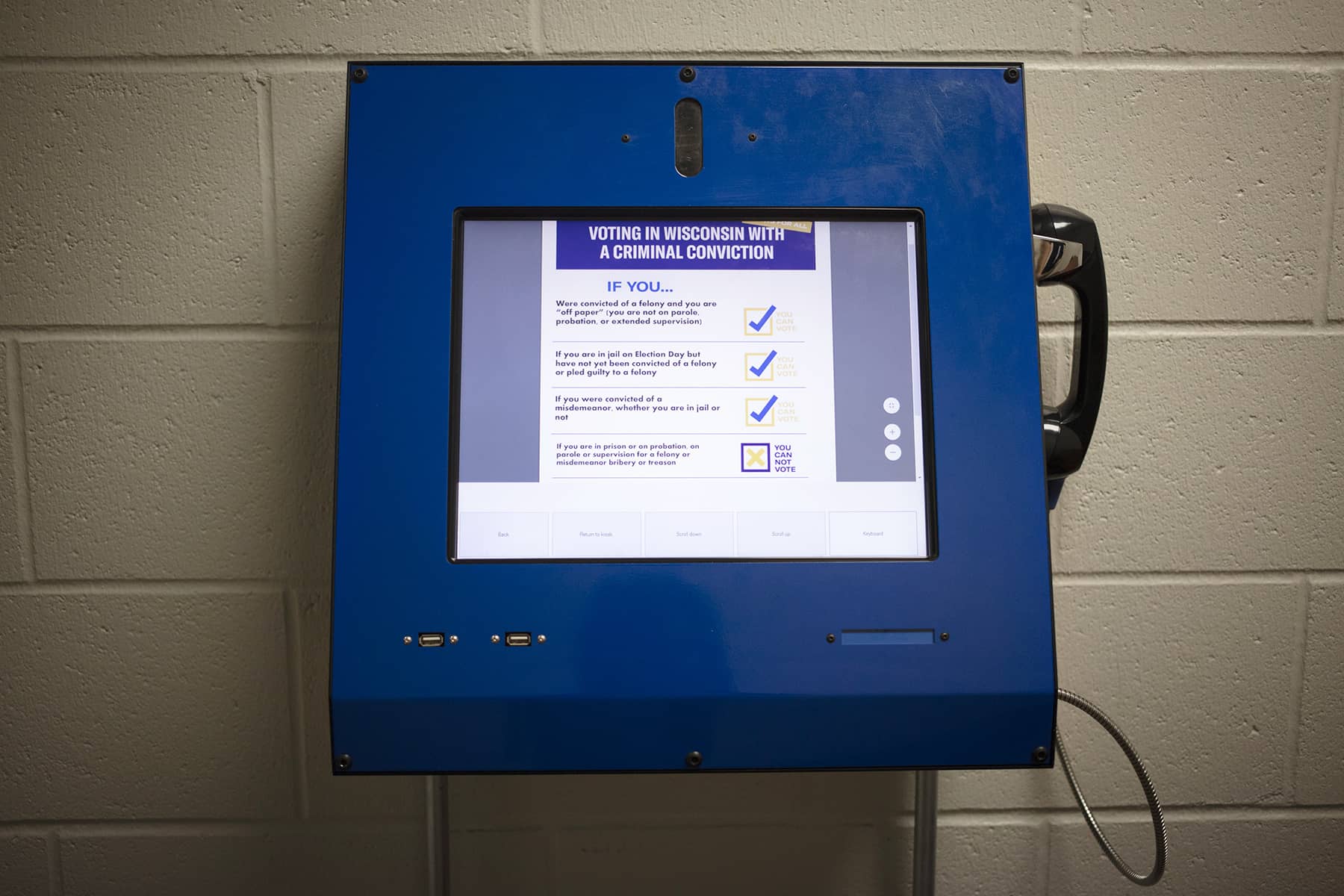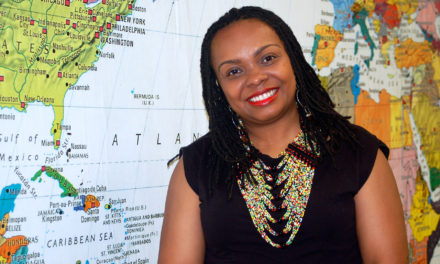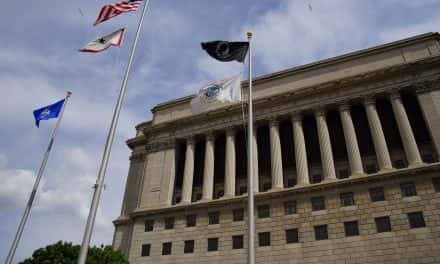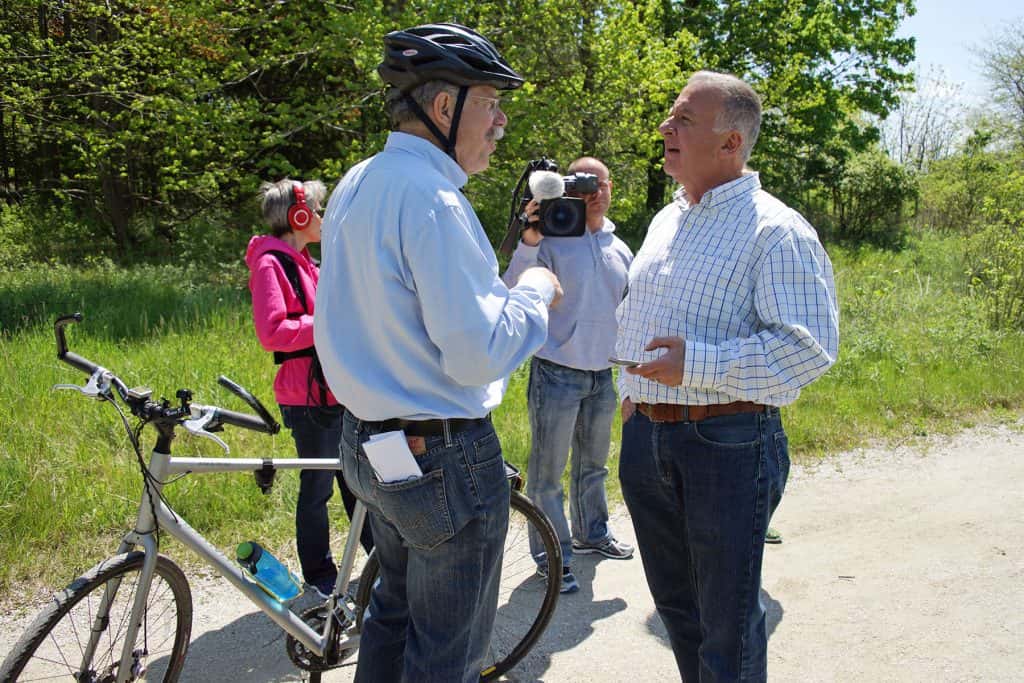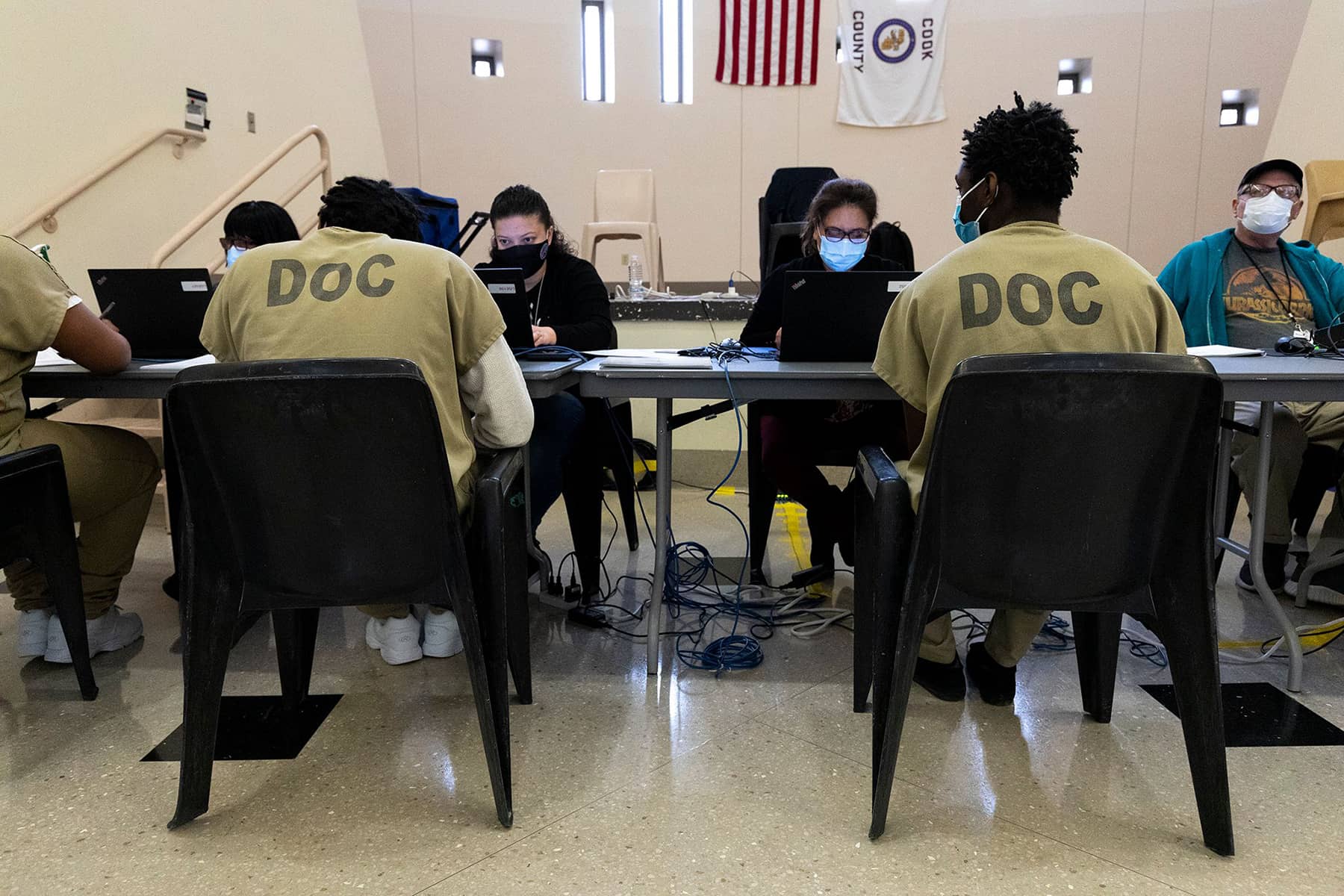
Within a few years of returning from two traumatic combat tours in Iraq and Afghanistan, David Carlson lost his voting rights. He spent about four years in prison on felony charges that in Wisconsin result in disenfranchisement. What Carlson did not realize is that while he sat in jail prior to his conviction, he could have cast a ballot. Only, he says, no one told him he was still eligible.
While tens of thousands of Wisconsinites are legally barred from voting because of felony convictions, thousands more eligible voters in local jails face persistent barriers to casting a ballot.
Advocates with Demos, a progressive think tank, call this “de facto disenfranchisement.”
“Disenfranchisement is, in my opinion, a violation of our constitutional liberties, especially individuals who are eligible to vote and the only barrier is the fact that they’re in a jail that doesn’t have a well defined process,” said Carlson, now a community organizer and law school student.
The Wisconsin state constitution enshrines voting as a right for all adults with only two exceptions — people deemed incompetent by a court and those serving felony sentences.
Almost all of the roughly 20,000 people in Wisconsin’s prisons are ineligible to vote, as are the tens of thousands on probation, parole or extended supervision. Although the Department of Corrections notifies those with felony convictions when they have lost their voting rights, they do not alert them when they are restored.
But at any given time, some 10,000 to 12,000 people are locked up in the state’s county jails, with roughly half in on misdemeanor-related charges and/or awaiting trial, which means thousands likely still have the right to vote. Yet the number of those who actually cast a ballot is miniscule: about 50 in 2020, according to the American Civil Liberties Union of Wisconsin.
The ACLU found 47 counties with a policy, many from Lexipol, a Texas-based company that creates public safety policy templates that local governments can use and adapt. Sixteen counties lacked any written policy and 15 had something more detailed than the Lexipol policy template.
Some that said they had no policy also said they help people vote and communicate with local clerks. For example, Dane County has no jail voting policy, but the Sheriff’s Office said it has worked with local clerks to create protocols for voting, and a 2021 ACLU report noted that the county has improved access to voting over the years.
Only three counties said they tracked voter registration or absentee ballots from their facilities. Additionally, both the ACLU of Wisconsin found policies varied widely by location and jail.
Regardless of the presence or quality of a jail’s voting policy, hurdles remain for those incarcerated to obtain and cast a ballot. And a recent Supreme Court ruling banning drop boxes did not address an issue some Republicans raised: Whether state law requires all voters to place their absentee ballots in the mail themselves — which a person behind bars cannot do.
Voting rights for people incarcerated differ from state to state, and some jurisdictions work to ensure those rights can be exercised. In Illinois and Texas, like Wisconsin, people detained while awaiting trial can still vote. Those states are home to two of the country’s largest jails — in Harris and Cook counties — where officials have increased access to voting.
Cook County Sheriff Tom Dart said facilitating voting among people who are incarcerated is important.
“It embeds somebody in their community, their community decisions,” Dart said. “And it’s empowering. It makes you, the individual, feel as if you’re no different than a person who hasn’t been in a jail in the sense of, ‘I get the same vote they do and mine is equal to theirs.’ ”
Rough start leads to crime
Carlson said a troubled upbringing fraught with family trauma and violence landed him in the Minnesota juvenile detention system at a young age.
Carlson’s father was a Vietnam War veteran who struggled with related severe mental health trauma, compounded by his upbringing as a Black child in 1950s Mississippi.
“My mom and father were involved in criminal activity and were severely addicted to substances,” Carlson said.
Carlson’s mother remarried when he was 6 years old, but his stepfather, also addicted to drugs and alcohol, was abusive.
“These traumas in my youth led me into crime by 10 years old,” Carlson recalls. “I did time in group homes, graduated to juvenile detention, then to long-term youth incarceration in the Hennepin County Homeschool.”
After his release, his white grandparents adopted him and moved to a predominantly white community. He soon fell into alcohol dependence and joined the Wisconsin Army National Guard in an attempt to gain structure.
Looking back on his relationship with civic engagement, Carlson considers his service in the military — mirroring that of his father’s — not as an act of patriotism but acceptance.
“My family — my Black side, at least — has never been engaged politically,” he said. “Our service, I think, was more about almost like earning our place as an American.”
Carlson’s sense of civic engagement was born in prison, a product of his own will to change the trajectory of his life and help others who share the experience of incarceration and the disenfranchisement that often accompanies.
Voting help increases in Wisconsin jails
Retaining a right and being able to act on it, as Carlson discovered in prison, are two very different things.
Wisconsin jails operate at the county level, and each sheriff’s department and jail administration determines how the facility runs.
An eligible voter in jail could have access to the ballot accommodated or muddied by the jail policy — if there is one.
The number of counties spelling out jail-based voting procedures has increased in recent years, according to the ACLU of Wisconsin, the League of Women Voters of Wisconsin and All Voting is Local, which all have advocated for improvements.
In 2020, the coalition found that 28 counties had “brief policies with vague language,” 22 of which came from Lexipol. That first year, only Kenosha County could provide a “detailed policy.” The following year they found 22 counties had “created or improved a written policy.”
Milwaukee County, the state’s largest, has a policy that details the process and is also among the few that tracked voter participation in some form. At least 31 people have received an absentee ballot since 2020.
But the wide variety in policies means some eligible voters will never be told they can vote.
“It’s not enough to say that they have this right,” said Sgt. Doug Simpson, who oversees training at the Kenosha County jail. “You have to take the next few steps and say, ‘How are they going to go about doing these things?’ ”
Jail staff must facilitate voting, and Simpson said unless instructions are “spelled out A-B-C-D-E,” staff may not follow through.
In Kenosha, incarcerated people receive information about jail-based voting during intake. Simpson acts as the “designated facility liaison,” answering questions, checking voter registration online, photocopying identification and more.
Simpson is proud that his was the first Wisconsin facility to have a “progressive, proactive policy” concerning jail-based voting, and he’s happy to share their approach with anyone — especially fellow jail administrators — who inquire.
“It’s an important constitutional issue, and we want to be on the right side of it,” he said. And “from an agency standpoint, from a taxpayer standpoint, I don’t want to be defending lawsuits.”
Groups register the incarcerated
In the opposite corner of the state, several jails have made efforts to more routinely engage incarcerated people about their rights, through periodic postings, informational sessions or registration events.
Engagement is essential because incarceration is traumatic, and “there are bigger things that that person’s worried about than voting,” said Capt. Dave Riewestahl, administrator of the Eau Claire County Jail.
The ACLU’s initial 2020 report prompted Riewestahl to improve his facility’s voting policies. Teaming up with the League of Women Voters and Chippewa Valley Votes, a local voting advocacy group, they developed a multipronged approach.
Eau Claire County Jail now posts its voting guide online. Electronic kiosks in each housing unit allow people to check eligibility and registration and message a social worker with questions.
The jail has even held several voter registration drives, the first in 2021. Riewestahl said registrations are not tracked because he doesn’t think it’s appropriate for the sheriff’s office to track that information.
“For me, success is: we have the community coming into the jail, and teaching and bringing their passion really for the voting process, and then sharing that with those that are in custody, who want to learn how to vote get signed up,” he said.
Riewestahl, who is currently running for sheriff, questions the appropriateness of “somebody in a uniform with a star badge” trying to get people to vote. Instead, he wants to bring in “the actual subject matter experts.”
Volunteers drive process
Chippewa Valley Votes and the League of Women Voters have been central to organizing voter registration events in his jail.
Karen Voss, co-coordinator of Chippewa Valley Votes, said her group’s efforts have gone beyond Eau Claire County and included recent trips to Dunn County Jail to meet with residents in small groups.
“That has made a much bigger difference than I would have ever expected until it happened,” she said.
Volunteers can forge a “one-to-one connection” through casual, frank conversations, explaining the elected offices with direct impact on incarcerated people, such as sheriff, county board and city council.
One person confided that he assumed voting put him on “some sort of list” that opened him up to other responsibilities, like jury duty. Voss reassured him that was not the case.
After one event with several productive conversations, it turned out that none of the individuals was eligible to vote. But that didn’t mean the event was a failure.
“It was almost a paradigm shift for me,” Voss recalls. She thinks participants left with a clearer understanding of “their value and their potential ability to exercise the power to vote in the future.”
Carlson said the general lack of voter education and outreach in jails plays a key role in diminished civic engagement among incarcerated or formerly incarcerated people.
“There’s so many different laws in so many different states on who is eligible, when you’re eligible, if you get a felony conviction, so a lot of people just think that once you have a felony you can never vote again,” Carlson said. “They’re very quick to ensure that you know that your right has been taken. But, there is no transparency on when that right comes back.”
Eligible — but no ID
Like all voters, people who are incarcerated need certain things to register or request an absentee ballot, including an identification card that fits the state’s requirement for voter ID. A jail photograph won’t do.
“The jail knows who it has,” Carlson said. “They have fingerprints, they have all of that. So for there to be this arbitrary rule that, no, it has to be this state-issued ID, it’s stopping a lot of people from being able to engage that are in the jails.”
Both Texas and Wisconsin have voter ID laws, and accept identification specifically for voting.
In Harris County, home to Houston, the jail ensures eligible voters are able to get such ID beforehand, said Maj. Phillip Bosquez, who is in charge of roughly half the jail’s population.
Harris County is among the few jails nationwide that has some form of in-person voting.
Bosquez said the process starts weeks before an election and includes communication with elections officials about who is in the jail, who is registered to vote and who needs a voter ID.
Voter ID is a barrier for many incarcerated people who have difficulty accessing a voter-sanctioned ID — even before going to jail.
“A lot of people are like how do you not have an ID? Well, I can relate to that also. I was a drug addict and alcoholic,” Carlson said. “I very rarely had an ID ever on me. By the time I ended up in jail, my phone and my wallet were typically always gone.”
Many steps to in-jail voting
A lot has to go right for someone to vote behind bars in Wisconsin. Even if they happen to get locked up in a facility with a proactive policy and clear procedure, and an acceptable form of photo ID — they still might not be able to cast a ballot.
“The wheels of government move very, very slowly,” said Kenosha’s Simpson.
If a person incarcerated in Kenosha — which has not held voting-related events — begins the process to vote by mail two weeks prior to an election, Simpson said they are already too late.
He estimates they would need a month to get a copy of proper ID, absentee paperwork and for the staff to review it all, which means for anyone arrested and jailed weeks before an election it’s more difficult — if not impossible — to vote.
Riewestahl, of Eau Claire, said under the current law, it was possible that a person arrested and jailed the Monday before a Tuesday election could not vote.
Then, there is the reality of jail turnover. Riewestahl said 75% of his population leaves within 10 days.
“So how do you get somebody who’s never registered to vote or never even cared about voting — how do you get them engaged in a jail setting? And then they follow through to get them through the registration part, to get the absentee ballot, to then mail it out?” Riewestahl said. “They’re most likely going to be gone.”
Confusion reigns after ruling
Absentee voting in Wisconsin jails has been complicated by a recent court decision.
In July, the state Supreme Court ruled that voters can’t return their absentee ballots to drop boxes.
On August 31, a federal judge ruled that voters who have difficulty returning their own ballot can choose someone to return their ballot for them. The judge cited the federal Voting Rights Act, which protects voters with disabilities.
But the ruling did not address the rights of people in jail, and as of Aug. 16, the Wisconsin Elections Commission had not issued any guidance to clerks about incarcerated voters.
“The privileges available to a jail inmate vary from facility to facility and from person to person,” a WEC spokesperson said in an email.
There are several possible solutions to the problem. The state could make accommodations for incarcerated people similar to those who are hospitalized. Currently, someone hospitalized within seven days of an election — unable to go to the polls or mail an absentee ballot in time — “may appoint an agent to retrieve and deliver their absentee ballot,” according to the WEC.
The state could allow incarcerated people to appoint an agent to ferry their ballot to their clerk. But jail populations include people from across the state and country, potentially requiring an agent to travel long distances.
Chicago, Houston lead in access
Jails in Chicago and Houston bring the polls to their incarcerated voters.
Both efforts came from jail staff working directly with local advocacy groups and election officials. Bosquez quoted a phrase his boss, Sheriff Ed Gonzalez, uses regularly: “How does the community want us to return their neighbors back to them?”
Previously, voting by mail was the only method for the roughly 10,000 people in custody in Harris County. Bosquez said the jail still keeps that as the primary method for voting beginning weeks before an election because it’s logistically easier with such a large population.
But once the absentee ballot deadline passes, the jail then shifts to in-person voting, he said, identifying and notifying eligible voters of the option leading up to and on Election Day.
Chicago Votes, a voting rights advocacy group, had for years focused on voter registration drives on college campuses and concerts. When it decided to take those efforts into the Cook County Jail, members expected pushback from Sheriff Dart.
But they found the opposite, said Jen Dean, a co-executive director for the organization.
“He was actually super excited about it, wanted to do everything possible to make it a success,” she said. “And I definitely believe over the past five or six years he’s kept to that promise.”
The jail is now a temporary early voting location, allowing incarcerated people the chance to vote in person on the two weekends before an election.
During the June primary, voter turnout for the Cook County Jail was higher than the city as a whole, 25% for the jail and 20% for the city, Block Club Chicago reported in July.
“The more opportunities that people have to vote the better,” said Alex Boutros, community organizing manager for Chicago Votes.
Dart said voting is among the most substantive ways to get people engaged in the community, which can go a long way toward breaking the cycle of incarceration. He wants to make voters in his jail — who like all voters cast ballots for sheriff and judges — the most educated in the county.
In November 2021, for the first time, 96 voters — including people incarcerated and members of the public — cast a ballot at the Harris County Jail on Election Day, which included races for local offices and state constitutional amendments. The jail’s turnout was the median for the county’s 704 voting locations. The jail’s visitor lobby was also open to the public to vote, which state law requires for all polling places.
“Given the unique nature of this location, we believe this to be a profound success,” said Nadia Hakim, spokesperson for the Harris County Elections Administration.
In the March primary, more than 200 people cast a ballot from the jail. Bosquez said he expects the upcoming general election to be their biggest yet.
Coalition pushes voting behind bars
Carlson knows from personal experience the damage that can come from disenfranchisement.
He is now a part of the Wisconsin Voting Rights Coalition, a group of legal and advocacy organizations including the League of Women Voters and ACLU Wisconsin. The coalition collaborates with jails to increase voting registration.
During his previous time as an organizer with ACLU Wisconsin, Carlson compiled a voting rights toolkit for county jail administrators. The coalition has held at least 11 jail-based voter outreach events across Wisconsin, according to Eileen Newcomer, voter education manager with the League of Women Voters of Wisconsin.
Carlson, now living in Eau Claire, also runs two small businesses, a peer mentoring program for individuals leaving incarceration and a property business designed to ease rental and housing barriers often facing individuals who were recently incarcerated.
“I’m dealing with the exact population of individuals who, generally you know, end up in and out of jail, and are disenfranchised for one reason or another,” Carlson said, identifying the linkages between his work and his advocacy.
Participating in civic and community engagement can become personal for individuals who have experienced incarceration.
Shannon Ross, executive director of The Community, spent 17 years in various Wisconsin prisons on a homicide conviction starting at age 19.
Ross launched The Community in 2014 while still in prison. Since then, what began as a newsletter has grown into a nonprofit organization aimed at correcting the narrative surrounding formerly incarcerated people and their place in society.
Prior to his time in prison, Ross, like Carlson, never placed much stock in civic engagement.
“The reason I came to this work, of course, like so many, is that I was impacted by the system,” Ross said. “My advocacy has largely been on learning, education, preparation and agency for people that are incarcerated.”
Ross was released from prison only 23 months ago and is still 13 years away from regaining his voting rights.
That hasn’t stopped him from working to help others.
“I felt like there was some value in helping people understand their rights,” Ross said. “Even if I don’t vote, at least I can tell you what your rights are, I can give you an understanding of the landscape.”
He calls it an ecosystem of change — helping the formerly disenfranchised “engage in that power of voting.”
Matt Mencarini, Erin McGroarty, and Phoebe Petrovic
Аriаnа Lіndquіst and the Cооk Cоunty Shеrіff’s Offіcе
Originally published by wisconsinwatch.org
The nonprofit Wisconsin Center for Investigative Journalism collaborates with Wisconsin Public Radio, Wisconsin Public Television, other news media and the UW-Madison School of Journalism and Mass Communication. All works created, published, posted or disseminated by the Center do not necessarily reflect the views or opinions of UW-Madison or any of its affiliates.

